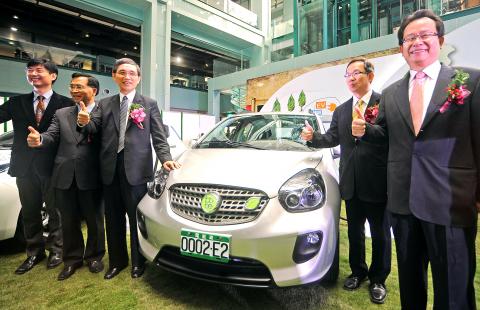There will be a boom in the popularity of electric vehicles in Taiwan in five or six years, Minister of Economic Affairs Shih Yen-shiang (施顏祥) said on Tuesday while presiding over a ceremony to mark the launch of a government project aimed at encouraging people to buy electric vehicles.
Shih said he arrived at the venue, the National Taiwan Science Education Center in Taipei, in an electric vehicle.
“It’s really cozy,” he said.

Photo: Liu Hsin-de, Taipei Times
Although such vehicles are not cheap, the Smart Electric Cars Pilot Project initiated by the Ministry of Economic Affairs has been set up to help people buy or lease such vehicles.
FUNDING
Under the three-year project, which has central-government funding of NT$2.2 billion (US$72.79 million), local governments will begin to build the basic infrastructure required for electric vehicles, including battery-charging stations, Shih said.
Once the market and relevant systems have expanded in five or six years, the electric vehicle industry will “rise up,” he said.
Under the ministry’s project, the Greater Taipei area and Greater Taichung would be the first regions in the country to implement low-carbon transportation options.
CHARGING STATIONS
In the capital, Yulon Motor Co (裕隆汽車) will make available 40 of its Luxgen multipurpose vehicles and 60 of its Tobe-brand M’Car compact cars for short-term leasing, while the governments of Taipei City and New Taipei City (新北市) will have the option of setting up 100 electric car charging stations around the greater Taipei region in the coming years, according to the Taipei Metropolis Low-Carbon Travel Program.
Greater Taichung has plans to build 161 charging stations and has purchased 64 electric vehicles for public use.
Shih said he expected Greater Tainan and Greater Kaohsiung would quickly catch up with the two pioneer regions in the promotion of low-carbon transport.

In Italy’s storied gold-making hubs, jewelers are reworking their designs to trim gold content as they race to blunt the effect of record prices and appeal to shoppers watching their budgets. Gold prices hit a record high on Thursday, surging near US$5,600 an ounce, more than double a year ago as geopolitical concerns and jitters over trade pushed investors toward the safe-haven asset. The rally is putting undue pressure on small artisans as they face mounting demands from customers, including international brands, to produce cheaper items, from signature pieces to wedding rings, according to interviews with four independent jewelers in Italy’s main

Japanese Prime Minister Sanae Takaichi has talked up the benefits of a weaker yen in a campaign speech, adopting a tone at odds with her finance ministry, which has refused to rule out any options to counter excessive foreign exchange volatility. Takaichi later softened her stance, saying she did not have a preference for the yen’s direction. “People say the weak yen is bad right now, but for export industries, it’s a major opportunity,” Takaichi said on Saturday at a rally for Liberal Democratic Party candidate Daishiro Yamagiwa in Kanagawa Prefecture ahead of a snap election on Sunday. “Whether it’s selling food or

CONCERNS: Tech companies investing in AI businesses that purchase their products have raised questions among investors that they are artificially propping up demand Nvidia Corp chief executive officer Jensen Huang (黃仁勳) on Saturday said that the company would be participating in OpenAI’s latest funding round, describing it as potentially “the largest investment we’ve ever made.” “We will invest a great deal of money,” Huang told reporters while visiting Taipei. “I believe in OpenAI. The work that they do is incredible. They’re one of the most consequential companies of our time.” Huang did not say exactly how much Nvidia might contribute, but described the investment as “huge.” “Let Sam announce how much he’s going to raise — it’s for him to decide,” Huang said, referring to OpenAI

The global server market is expected to grow 12.8 percent annually this year, with artificial intelligence (AI) servers projected to account for 16.5 percent, driven by continued investment in AI infrastructure by major cloud service providers (CSPs), market researcher TrendForce Corp (集邦科技) said yesterday. Global AI server shipments this year are expected to increase 28 percent year-on-year to more than 2.7 million units, driven by sustained demand from CSPs and government sovereign cloud projects, TrendForce analyst Frank Kung (龔明德) told the Taipei Times. Demand for GPU-based AI servers, including Nvidia Corp’s GB and Vera Rubin rack systems, is expected to remain high,